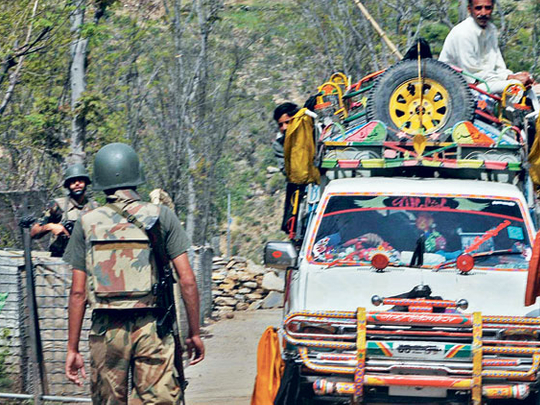
Pirano: In mountains not far from this village, Pakistani authorities say, terrorists are preparing their newest generation of spies, shooters and suicide bombers. In the village, under razor wire and the watch of soldiers, Pakistan is trying to give some of the recruits back their childhoods.
At a new school tucked near the fragile peace of the Swat Valley, peach-fuzzed veterans of Taliban camps wear burgundy sweaters to math classes, counselling sessions and religion lessons, where they hear that Islam favours democracy over suicide. Teachers work in fear of militant attacks and of hardened students — but also in hopes of de-radicalising the gangly boys who make up a growing part of Pakistan's insurgency.
Analysts say there is an urgent need. Pakistan is home to the toxic mix of a significant youth population, few job prospects and a rising Islamist insurgency. Military officials say most suicide bombings are now carried out by males younger than 20. The 86 adolescents at this army-sponsored school are a drop in that ocean, a fact that its director, neuropsychologist Feriha Peracha, said she tries not to dwell on. "It can have a ripple effect," Peracha said. "We are a time bomb if we don't do this."
Poor research
Though child soldiers have toted guns in conflicts worldwide, international experts say their indoctrination and reform has been poorly researched. Organisers of this boarding school — the first of its kind in Pakistan — say it is providing a valuable, if small, window into the backgrounds of Pakistan's young fighters and the triggers that vault them into the hands of militants.
All of the students came to the school after being captured by the army, or were brought here by their families. Some had been trained by insurgent groups as slaves or thieves, some as bombers.
One teen watched children vanish from his camp until a commander directed him, too, to strap on a suicide vest, then relented when he refused. Another named Saddam Hussain — a common name in a region where people admire the former Iraqi leader — was surrendered by his own relatives to the militants, who had controlled Swat until last summer.
"Three people in our area refused to send their family members, and they were killed," Saddam's uncle told Peracha during a recent meeting that she allowed a reporter to observe. Insurgents taught his nephew to shoot and "promised him heaven, vehicles, guns and authority".
The patterns among the boys have been revealing, Peracha said. Few attended the Islamic schools, or madrasas, often blamed for fuelling radicalism in Pakistan. Though all trained in the Swat Valley, they pledged allegiance to different insurgent leaders, indicating the mixing of Pakistan's many militant groups.
More significantly, she and other teachers said, most of the boys are middle children who have been lost in the shuffle of large, poor families with absent fathers. Few had much formal schooling, many are aggressive, and most score poorly on educational aptitude tests.
In that regard, Peracha said they seem more like the juvenile delinquents she has counselled in Pakistan and Britain than religious zealots — an observation that points to Pakistan's even more deeply entrenched problems of dismal schooling and profound poverty.
"The civil society and the rest of Pakistan really react until it nearly hit Islamabad," Peracha said of the militant movement that last year seized territory located within 60 miles of the capital. "And we still aren't reacting [in] the education system, which is frozen in time."
That has created a vacuum that militants are increasingly exploiting. In lawless South Waziristan, poor boys attended an insurgent school painted with murals of the paradise awaiting martyrs, said Brigadier Syed Azmat Ali, a military spokesman. In Swat, children were ill-equipped to challenge the notion that Pakistani troops were infidels who deserved death.
"They knew extremely little about the world or about Islam," said Mohammad Farooq, a Swat University vice-chancellor and religious scholar in charge of Islamic education at the school for former militants. "They had just a superficial knowledge that we are Muslims and we have to fight America and their stooges."
He and Peracha said they believe the programme, which combines tough love and discipline with a standard curriculum and regular counselling, is working. To assess the boys' risk levels, Peracha performs standardised neuropsychology tests and gently pries out their stories over several meetings.
Sample
In a courtyard, Peracha met Khair Hussain, 15, a new student just released from army detention. In a near-whisper, he said he was the son of a labourer working in Saudi Arabia. He went to a Pakistani public school until it was bombed, then a madrasa. It was there that militants tied his hands and blindfolded him, he said, as they took him to a 100-person camp somewhere amid Swat's picturesque peaks.
In a telephone interview, a Taliban fighter in the border area of North Waziristan denied that militants abduct children or force them to carry out bombings, saying young boys "come to us willingly to present their own lives".
Pakistan army officials say they doubt that. After rounding up several traumatised children during a military operation in Swat last summer, they asked Peracha to evaluate some, said Lieutenant Colonel Aamer Najam, a Swat battalion commander. That sparked the reform school, which is expanding to take on child militants from South Waziristan.
Peracha said she eventually wants to take de-radicalisation programmes to Pakistan's prisons. For now, her mission is to create some sort of future for her first charges.












